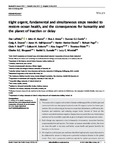Eight urgent, fundamental and simultaneous steps needed to restore ocean health, and the consequences for humanity and the planet of inaction or delay
| dc.contributor.author | Laffoley, D | |
| dc.contributor.author | Baxter, JM | |
| dc.contributor.author | Amon, DJ | |
| dc.contributor.author | Currie, DEJ | |
| dc.contributor.author | Downs, CA | |
| dc.contributor.author | Hall‐Spencer, JM | |
| dc.contributor.author | Harden‐Davies, H | |
| dc.contributor.author | Page, R | |
| dc.contributor.author | Reid, CP | |
| dc.contributor.author | Roberts, CM | |
| dc.contributor.author | Rogers, A | |
| dc.contributor.author | Thiele, T | |
| dc.contributor.author | Sheppard, CRC | |
| dc.contributor.author | Sumaila, RU | |
| dc.contributor.author | Woodall, LC | |
| dc.date.accessioned | 2019-09-03T12:29:06Z | |
| dc.date.available | 2019-09-03T12:29:06Z | |
| dc.date.issued | 2019-07-23 | |
| dc.identifier.issn | 1052-7613 | |
| dc.identifier.issn | 1099-0755 | |
| dc.identifier.other | aqc.3182 | |
| dc.identifier.uri | http://hdl.handle.net/10026.1/14865 | |
| dc.description.abstract |
<jats:title>Abstract</jats:title><jats:p> <jats:list> <jats:list-item><jats:p>The ocean crisis is urgent and central to human wellbeing and life on Earth; past and current activities are damaging the planet's main life support system for future generations. We are witnessing an increase in ocean heat, disturbance, acidification, bio‐invasions and nutrients, and reducing oxygen levels. Several of these act like ratchets: once detrimental or negative changes have occurred, they may lock in place and may not be reversible, especially at gross ecological and ocean process scales.</jats:p></jats:list-item> <jats:list-item><jats:p>Each change may represent a loss to humanity of resources, ecosystem function, oxygen production and species. The longer we pursue unsuitable actions, the more we close the path to recovery and better ocean health and greater benefits for humanity in the future.</jats:p></jats:list-item> <jats:list-item><jats:p>We stand at a critical juncture and have identified eight priority issues that need to be addressed in unison to help avert a potential ecological disaster in the global ocean. They form a purposely ambitious agenda for global governance and are aimed at informing decision‐makers at a high level. They should also be of interest to the general public.</jats:p></jats:list-item> <jats:list-item><jats:p>Of all the themes, the highest priority is to rigorously address global warming and limit surface temperature rise to 1.5°C by 2100, as warming is the pre‐eminent factor driving change in the ocean. The other themes are establishing a robust and comprehensive High Seas Treaty, enforcing existing standards for Marine Protected Areas and expanding their coverage, especially in terms of high levels of protection, adopting a precautionary pause on deep‐sea mining, ending overfishing and destructive fishing practices, radically reducing marine pollution, putting in place a financing mechanism for ocean management and protection, and lastly, scaling up science/data gathering and facilitating data sharing.</jats:p></jats:list-item> <jats:list-item><jats:p>By implementing all eight measures in unison, as a coordinated strategy, we can build resilience to climate change, help sustain fisheries productivity, particularly for low‐income countries dependent on fisheries, protect coasts (e.g. via soft‐engineering/habitat‐based approaches), promote mitigation (e.g. carbon storage) and enable improved adaptation to rapid global change.</jats:p></jats:list-item> </jats:list></jats:p> | |
| dc.format.extent | 194-208 | |
| dc.language | en | |
| dc.language.iso | en | |
| dc.publisher | Wiley | |
| dc.subject | climate change | |
| dc.subject | deep-sea mining | |
| dc.subject | finance | |
| dc.subject | fisheries | |
| dc.subject | fishing | |
| dc.subject | high seas | |
| dc.subject | MPAs | |
| dc.subject | ocean | |
| dc.subject | pollution | |
| dc.subject | protection | |
| dc.subject | scientific research | |
| dc.subject | sustainability | |
| dc.title | Eight urgent, fundamental and simultaneous steps needed to restore ocean health, and the consequences for humanity and the planet of inaction or delay | |
| dc.type | journal-article | |
| dc.type | Journal Article | |
| plymouth.author-url | https://www.webofscience.com/api/gateway?GWVersion=2&SrcApp=PARTNER_APP&SrcAuth=LinksAMR&KeyUT=WOS:000477523400001&DestLinkType=FullRecord&DestApp=ALL_WOS&UsrCustomerID=11bb513d99f797142bcfeffcc58ea008 | |
| plymouth.issue | 1 | |
| plymouth.volume | 30 | |
| plymouth.publication-status | Published | |
| plymouth.journal | Aquatic Conservation: Marine and Freshwater Ecosystems | |
| dc.identifier.doi | 10.1002/aqc.3182 | |
| plymouth.organisational-group | /Plymouth | |
| plymouth.organisational-group | /Plymouth/Faculty of Science and Engineering | |
| plymouth.organisational-group | /Plymouth/Faculty of Science and Engineering/School of Biological and Marine Sciences | |
| plymouth.organisational-group | /Plymouth/PRIMaRE Publications | |
| plymouth.organisational-group | /Plymouth/REF 2021 Researchers by UoA | |
| plymouth.organisational-group | /Plymouth/REF 2021 Researchers by UoA/UoA07 Earth Systems and Environmental Sciences | |
| plymouth.organisational-group | /Plymouth/Research Groups | |
| plymouth.organisational-group | /Plymouth/Research Groups/Marine Institute | |
| plymouth.organisational-group | /Plymouth/Users by role | |
| plymouth.organisational-group | /Plymouth/Users by role/Academics | |
| dcterms.dateAccepted | 2019-05-13 | |
| dc.rights.embargodate | 2020-7-22 | |
| dc.identifier.eissn | 1099-0755 | |
| dc.rights.embargoperiod | Not known | |
| rioxxterms.versionofrecord | 10.1002/aqc.3182 | |
| rioxxterms.licenseref.uri | http://www.rioxx.net/licenses/all-rights-reserved | |
| rioxxterms.licenseref.startdate | 2019-07-23 | |
| rioxxterms.type | Journal Article/Review |


